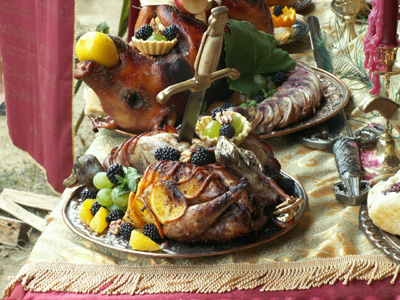

What's for Supper?
What’s for Supper asks questions about food and drink.
Food in the Middle Ages varied considerably between peasants and the nobility. For most, the diet was almost completely made up of bread, cheese, vegetables and ale, with the occasional bit of pork, as pigs were the easiest animals to keep. Hunting was the reserve of the nobility, with strict punishments for peasants who took their masters' game. The diets of the rich were low in vegetables and high in meat and spices so, ironically, it was the poor who had the healthier diet; that is, if their crops did not fail. Starvation was their main concern, whilst for the rich, obesity and lack of nutrients caused many health problems.
Ready for more?
not all...
quizzers. Try to win a coveted spot on our Hall of Fame Page.






